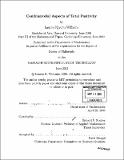Combinatorial aspects of total positivity
Author(s)
Williams, Lauren Kiyomi
DownloadFull printable version (5.554Mb)
Other Contributors
Massachusetts Institute of Technology. Dept. of Mathematics.
Advisor
Richard P. Stanley.
Terms of use
Metadata
Show full item recordAbstract
In this thesis I study combinatorial aspects of an emerging field known as total positivity. The classical theory of total positivity concerns matrices in which all minors are nonnegative. While this theory was pioneered by Gantmacher, Krein, and Schoenberg in the 1930s, the past decade has seen a flurry of research in this area initiated by Lusztig. Motivated by surprising positivity properties of his canonical bases for quantum groups, Lusztig extended the theory of total positivity to arbitrary reductive groups and real flag varieties. In the first part of my thesis I study the totally non-negative part of the Grassmannian and prove an enumeration theorem for a natural cell decomposition of it. This result leads to a new q-analog of the Eulerian numbers, which interpolates between the binomial coefficients, the Eulerian numbers, and the Narayana numbers. In the second part of my thesis I introduce the totally positive part of a tropical variety, and study this object in the case of the Grassmannian. I conjecture a tight relation between positive tropical varieties and the cluster algebras of Fomin and Zelevinsky, proving the conjecture in the case of the Grassmannian. The third and fourth parts of my thesis explore a notion of total positivity for oriented matroids. Namely, I introduce the positive Bergman complex of an oriented matroid, which is a matroidal analogue of a positive tropical variety. I prove that this object is homeomorphic to a ball, and relate it to the Las Vergnas face lattice of an oriented matroid. When the matroid is the matroid of a Coxeter arrangement, I relate the positive Bergman complex and the Bergman complex to the corresponding graph associahedron and the nested set complex.
Description
Thesis (Ph. D.)--Massachusetts Institute of Technology, Dept. of Mathematics, 2005. Includes bibliographical references (p. 115-119).
Date issued
2005Department
Massachusetts Institute of Technology. Department of MathematicsPublisher
Massachusetts Institute of Technology
Keywords
Mathematics.